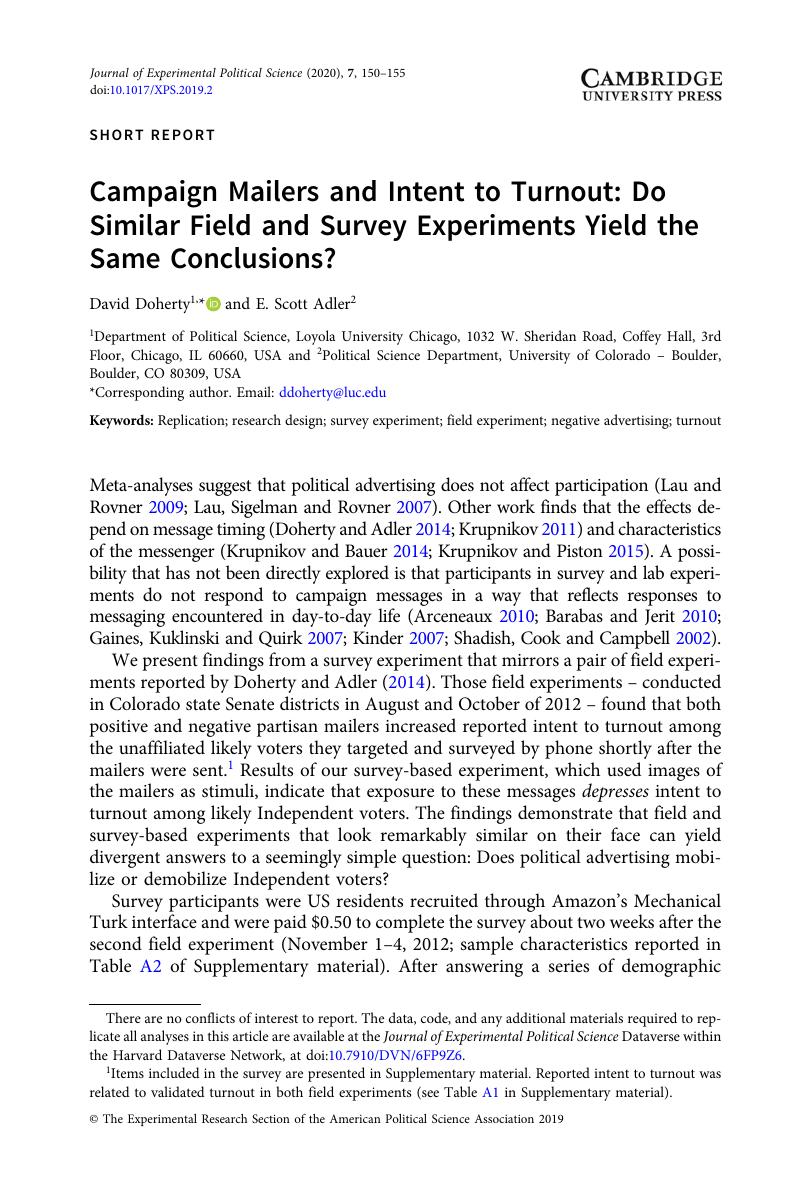No CrossRef data available.
Article contents
Campaign Mailers and Intent to Turnout: Do Similar Field and Survey Experiments Yield the Same Conclusions?
Published online by Cambridge University Press: 20 February 2019
Abstract
An abstract is not available for this content so a preview has been provided. Please use the Get access link above for information on how to access this content.

- Type
- Short Report
- Information
- Copyright
- © The Experimental Research Section of the American Political Science Association 2019
Footnotes
There are no conflicts of interest to report. The data, code, and any additional materials required to replicate all analyses in this article are available at the Journal of Experimental Political Science Dataverse within the Harvard Dataverse Network, at doi:10.7910/DVN/6FP9Z6.
References
Arceneaux, Kevin. 2010. The Benefits of Experimental Methods for the Study of Campaign Effects. Political Communication 27: 199–215.CrossRefGoogle Scholar
Barabas, Jason and Jerit, Jennifer. 2010. Are Survey Experiments Externally Valid? American Political Science Review 104: 226–42.CrossRefGoogle Scholar
Berinsky, Adam J., Huber, Gregory A., and Lenz, Gabriel S.. 2012. Evaluating Online Labor Markets for Experimental Research: Amazon.com’s Mechanical Turk. Political Analysis 20: 351–68.CrossRefGoogle Scholar
Doherty, David. 2018. Replication Data for: Campaign Mailers and Intent to Turnout: Do Similar Field and Survey Experiments Yield the Same Conclusions? Harvard Dataverse, V1. https://doi.org/10.7910/DVN/6FP9Z6.CrossRefGoogle Scholar
Doherty, David and Adler, E. Scott. 2014. The Persuasive Effects of Partisan Campaign Mailers. Political Research Quarterly 67: 562–73.CrossRefGoogle Scholar
Gaines, Brian J., Kuklinski, James H., and Quirk, Paul J.. 2007. The Logic of the Survey Experiment Reexamined. Political Analysis 15: 1–20.CrossRefGoogle Scholar
Gerber, Alan S., Gimpel, James G., Green, Donald P., and Shaw, Daron R.. 2011. How Large and Long-lasting Are the Persuasive Effects of Televised Campaign Ads? Results from a Randomized Field Experiment. American Political Science Review 105: 135–50.CrossRefGoogle Scholar
Jerit, Jennifer, Barabas, Jason, and Clifford, Scott. 2013. Comparing Contemporaneous Laboratory and Field Experiments on Media Effects. Public Opinion Quarterly 77:256–82.CrossRefGoogle Scholar
Kinder, Donald. 2007. Curmudgeonly Advice. Journal of Communication 57: 155–62.CrossRefGoogle Scholar
Krupnikov, Yanna. 2011. When Does Negativity Demobilize? Tracing the Conditional Effect of Negative Campaigning on Voter Turnout. American Journal of Political Science 55: 797–813.CrossRefGoogle Scholar
Krupnikov, Yanna and Levine, Adam Seth. 2014. Cross-Sample Comparisons and External Validity. Journal of Experimental Political Science 1: 59–80.CrossRefGoogle Scholar
Krupnikov, Yanna and Bauer, Nichole M.. 2014. The Relationship Between Campaign Negativity, Gender and Campaign Context. Political Behavior 36: 167–88.CrossRefGoogle Scholar
Krupnikov, Yanna and Piston, Spencer. 2015. Accentuating the Negative: Candidate Race and Campaign Strategy. Political Communication 32: 152–73.CrossRefGoogle Scholar
Lau, Richard R. and Rovner, Ivy Brown. 2009. Negative Campaigning. Annual Review of Political Science 12: 285–306.CrossRefGoogle Scholar
Lau, Richard R., Sigelman, Lee, and Rovner, Ivy Brown. 2007. The Effects of Negative Political Campaigns: A Meta-Analytic Reassessment. Journal of Politics 69: 1176–209.CrossRefGoogle Scholar
Mullinix, Kevin J., Leeper, Thomas J., Druckman, James N., and Freese, Jeremy. 2015. The Generalizability of Survey Experiments. Journal of Experimental Political Science 2: 109–38.CrossRefGoogle Scholar
Shadish, William R., Cook, Thomas D., and Campbell, Donald T.. 2002. Experimental and Quasi-experimental Designs for Generalized Causal Inference. Boston: Houghton Mifflin.Google Scholar




